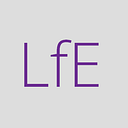Strategies for Evaluating your Information Sources
MSc. Healthcare Management
R21- 0892/R23–1035 — ZNON00881 MSc Healthcare Leadership
The Elizabeth Garrett Anderson Senior Leader Apprenticeship ; Level 7 NHS Clinicians (Distance Learning Programme)
Online presentation — Slides with full script
Menti activities — 2 open ended Questions
Activity 1 — Question — Why do you read?
Activity 2 — Question — Think about an instance in which you used sources of information in a decision making process. What questions did you ask of that information?
Evaluating Sources
Introduction
Throughout your studies, you will encounter a vast amount of information from a variety of sources. In order to use this information effectively to support your work, you need to establish the reliability, objectivity and relevance of the evidence you find. This resource will help you to develop strategies for evaluating sources.
This presentation will look at:
1. Thinking about reading and your research goals
2. Evaluating sources
3. Identifying reliable information
4. My Learning Essentials and Further support
Icebreaker — Activity 1 — Menti — Why do you read? (open ended)
Have you ever really thought about it? From an academic perspective there are three strands to the reading process. (Slide 3) Depending on what you need to know depends on the source you may turn to but do you turn sources for ease of access in the first instance or to sources you know you can trust…
Questioning your sources
Google (slides 5–6)
Think about how/why sources may be questioned (slide 7)
Critical Reading — A Proactive Approach
Purpose– Why are you reading this?
Context– What questions do you have for the text?
Identify — What is the Author’s main idea/s?
Understand — What is my opinion/understanding of the main idea/s?
(Slides 8–9)
Questioning information sources — Activity 2 — menti
Think about an instance in which you used sources of information in a decision making process. What questions did you ask of that information?
Evaluating Information -a checklist and other MLE resources
What type of resource is it?
What is the content? Is it relevant to my topic?
Why was it produced? Is it objective?
When was it produced?
How was this information produced? Does the author include references?
How was the data collected?
Where was it published?
Who wrote it?
Who is the target audience?
(slides 10–15)
Analysing the text — It Says, I Say, And So… (slide 16)
It Says, I Say And So… is often a concept we talk about in our Academic Writing Workshops
We use it to help students and researchers make the link between their critical reading and academic writing
The breakdown is as follows;
It Says = the text says…. So when evaluating text what is it saying?
I Say = this is important in academic writing but it is also important when forming your own views/conclusions.. It’s also about putting the ideas into your own words which indicates your own understanding of these ideas..
And So = in academic writing this is asking what are you going to do/say (in your essay) having evaluated the evidence
In clinical practice the And So may be about instigating new protocols/procedures etc…
ROR — Reliability - Objectivity — Relevance (slide 17)
Reliability: Is the evidence trustworthy? There needs to be a good reason to believe that the information presented is accurate and complete in order for a source to be considered reliable.
Objectivity: Is the evidence objective/neutral? Note that a source doesn’t need to be objective for you to use it in your work. In some cases, you may be seeking sources from a particular perspective to illustrate a point, or provide a counter-argument. However, it is important that you are aware of any bias when using a source.
Relevance: Is the evidence useful/relevant? A source can be reliable, objective and of a generally high quality, but if it’s not relevant to your work then there’s no point in using it.
Popular vs scholarly sources of information (slides 18–20)
Scholarly sources:
•are often evidence-based
•are often peer-reviewed
•use academic language
usually provide an in-depth analysis
Popular sources:
•are often based on opinion
•may follow an editorial process but are not always corroborated
•use everyday language
- often deal with broad issues
Although popular sources do not go through the rigorous peer-review process they can still be useful. You might not form the basis of an argument on a newspaper article, but you might cite a newspaper article to demonstrate that an idea is being discussed in the mainstream.
Primary, secondary and tertiary sources
Usually primary resources are the first information sources you should be using. These allow you to see all the data/analysis first hand and form your own opinions
Secondary sources are useful to gather opinion/evidence that supports the primary sources however be careful that you are not misrepresenting/misinterpreting the original data based on what is recorded in the secondary source/s
Tertiary sources are usually concise overviews of an idea/event/scenario. It will contain the basic facts but may lack specific detail. Dictionaries, encyclopaedias
MLE Resources and further help;
The My Learning Essentials online resources also contain information on developing academic skills including critical reading. The resources signposted in this presentation can be found on the MLE webpages/
The Library provide support in many ways including:
Library Website
Library Chat
Drop-ins
1–2–1s
Email us at: uml.teachingandlearning@manchester.ac.uk
Internal note — this plan was created by CH (T&L Team) 1 February 2024 For R23–1035 ZNON00881, Session 5. Cohort 4.2. MSc Healthcare Leadership ; The Elizabeth Garrett Anderson Senior Leader Apprenticeship Level 7 NHS Clinicians (Distance Learning Programme). Updated by AT for 20 March 2024 for ID R24–1156. ZNON00881, Session 2 of 3
